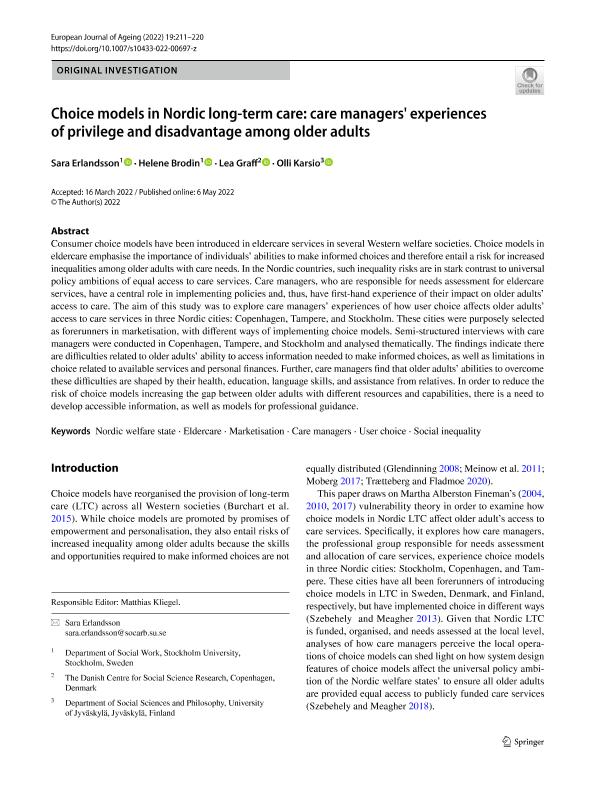| LDR | | | 00000cab a2200000 4500 |
| 001 | | | MAP20220017213 |
| 003 | | | MAP |
| 005 | | | 20220609161642.0 |
| 008 | | | 220609e20220606esp|||p |0|||b|spa d |
| 040 | | | $aMAP$bspa$dMAP |
| 084 | | | $a931.2 |
| 245 | 0 | 0 | $aChoice models in Nordic long-term care$b: care managers' experiences of privilege and disadvantage among older adults$cSara Erlandsson...[et.al.] |
| 520 | | | $aConsumer choice models have been introduced in eldercare services in several Western welfare societies. Choice models in eldercare emphasise the importance of individuals' abilities to make informed choices and therefore entail a risk for increased inequalities among older adults with care needs. In the Nordic countries, such inequality risks are in stark contrast to universal policy ambitions of equal access to care services. Care managers, who are responsible for needs assessment for eldercare services, have a central role in implementing policies and, thus, have first-hand experience of their impact on older adults' access to care. The aim of this study was to explore care managers' experiences of how user choice affects older adults' access to care services in three Nordic cities: Copenhagen, Tampere, and Stockholm. These cities were purposely selected as forerunners in marketisation, with different ways of implementing choice models. Semi-structured interviews with care managers were conducted in Copenhagen, Tampere, and Stockholm and analysed thematically. The findings indicate there are difficulties related to older adults' ability to access information needed to make informed choices, as well as limitations in choice related to available services and personal finances. Further, care managers find that older adults' abilities to overcome these difficulties are shaped by their health, education, language skills, and assistance from relatives. In order to reduce the risk of choice models increasing the gap between older adults with different resources and capabilities, there is a need to develop accessible information, as well as models for professional guidance.
|
| 540 | | | $aLa copia digital se distribuye bajo licencia "Attribution 4.0 International (CC BY 4.0)"$f$uhttps://creativecommons.org/licenses/by/4.0$943 |
| 650 | | 4 | $0MAPA20080618988$aAtención a la tercera edad |
| 650 | | 4 | $0MAPA20100044407$aPersonas mayores |
| 650 | | 4 | $0MAPA20090043374$aAtención sociosanitaria |
| 650 | | 4 | $0MAPA20080586461$aModelos de gestión |
| 651 | | 1 | $0MAPA20080637811$aSuecia |
| 651 | | 1 | $0MAPA20080638177$aFinlandia |
| 651 | | 1 | $0MAPA20080638160$aDinamarca |
| 773 | 0 | | $wMAP20210024146$g06/06/2022 Volumen 19 Número 2 - 2022 , p. 211-220$tEuropean Journal of Ageing : social, behavioural and health perspectives$dCham, Switzerland [etc.] : Springer International Publishing AG, 2021- |
| 856 | | | $qapplication/pdf$w1115695$yRecurso electrónico / Electronic resource |


